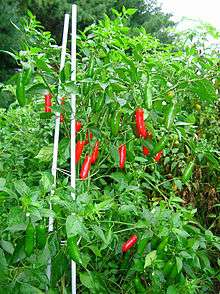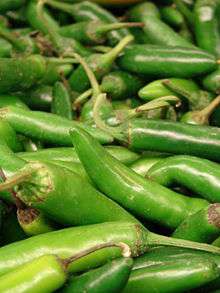Serrano pepper
| Serrano pepper | |
|---|---|
 Serrano pepper plant with red and green fruits | |
| Species | Capsicum annuum |
| Origin | Puebla and Hidalgo Mexico |
| Heat |
|
| Scoville scale | 10,000–25,000 SHU |
The serrano pepper (Capsicum annuum) is a type of chili pepper that originated in the mountainous regions of the Mexican states of Puebla and Hidalgo.[1] The name of the pepper is a reference to the mountains (sierras) of these regions.[1]
Serrano plant
Mature serrano pepper plants reach a height of 0.5 to 1.5 m (1.5 to 5.0 ft) tall.[1] Each plant can hold up to 50 pepper pods.[1] The fruit can be harvested while they are green or ripe. Unripe serrano peppers are green, but the color at maturity varies. Common colors are green, red, brown, orange, or yellow. Serrano peppers do better in soils with a pH between 7.0 and 8.5 and in warm temperatures above 75°F (24°C); they are not frost-tolerant. [2]
Serrano fruit
The Scoville rating of the serrano pepper is 10,000 to 25,000.[3] They are typically eaten raw and have a bright and biting flavor that is notably hotter than the jalapeño pepper. Serrano peppers are also commonly used in making pico de gallo and salsa, as the chili is particularly fleshy compared to others, making it ideal for such dishes.[1]
It is one of the most-used chili peppers in Mexican cuisine. The Mexican states of Veracruz, Sinaloa, Nayarit, and Tamaulipas produce about 180,000 tons of serranos each year.[4]

See also
References
- 1 2 3 4 5 DeWitt, Dave; Paul W. Boslund (2009). The Complete Chile Pepper Book: A Gardener's Guide to Choosing, Growing, Preserving, and Cooking. Timber Press. p. 64. ISBN 0-88192-920-4.
- ↑ "Growing Serrano Peppers". PlantDex. Retrieved 7 June 2012.
- ↑ "Types of hot peppers". Retrieved 12 March 2010.
- ↑ Nolte, Kurt. "Serrano Peppers" (PDF). cals.arizona.edu. Retrieved 30 August 2012.